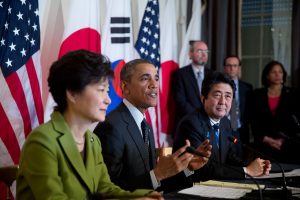Over the past two years, a noticeable feature of President Park Geun-hye’s foreign policy has been Seoul’s warming diplomatic relations with Beijing. Both the state visit by President Xi Jinping in July, and the Park administration’s push to finish negotiations with Beijing on a free trade agreement this year, suggest that the Blue House is adopting a strong pro-China posture. Most recently, the two sides signed a memorandum of understanding on establishing a military hotline, perhaps hinting at their intention to cooperate more closely on North Korea.
Meanwhile, the Park administration’s opposition to the Abe government’s reinterpretation of Japan’s constitution, alongside its strong denunciation of Tokyo’s revisionist attitudes towards Japan’s colonial legacy, seem to hint at a shift in the longstanding ROK-Japan partnership.
However, on closer inspection, the Blue House appears to be pursuing a more nuanced foreign policy, aimed at maximizing the economic benefits of maintaining closer ties with Beijing while also supporting the traditional alliance structure in the region.
Although relations between Seoul and Beijing appear nearly seamless as of late, there are several areas where the two countries’ interests do not align. Donga Weekly recently reported that China attempted to stop Seoul from donating an old Pohang-class corvette to the Philippines. According to multiple government sources, high-ranking Chinese diplomats met with their South Korean counterparts in June to warn Seoul that delivering the corvette could negatively impact the then-upcoming summit between Xi and Park. South Korea’s Ministry of Defense confirmed that Chinese officials had requested a meeting to discuss the corvette, but refused to go into further detail.
As far as is known, Seoul hasn’t reneged on its promise to Manila and, despite Beijing’s warnings, Xi still met with Park. This shouldn’t be surprising. Although China may be upset about South Korea providing the Philippines with military assets, closer economic and financial cooperation with Seoul also advances Beijing’s other objectives, such as promoting the renminbi as a global currency.
South Korea’s foreign policy calculations are similarly multi-faceted. North Korea remains South Korea’s foremost security threat, and Seoul therefore adopts defense policies that best ensure the country’s safety. Here, Beijing’s role is vital, but still limited compared to that of the United States and Japan.
The timing of South Korea’s promise to the Philippines regarding the corvette is consistent with this assessment. The then-Minister of Defense Kim Kwan-jin (currently the chief of the Blue House National Security Office) met with his Philippine counterpart on May 30, one day before he expressed the Park administration’s willingness to reconsider the previous Lee Myung-bak administration’s decision to scrap the military intelligence sharing agreement with Japan. Seoul’s decision to provide Manila with the corvette is also in lock step with Tokyo’s efforts to bolster the naval capabilities of countries in Southeast Asia. For instance, Japan made a deal with the Philippines in 2013 to supply the latter with ten multi-role response vessels, and recently agreed to sell Vietnam six maritime surveillance vessels.
In addition to the warship, South Korea is making headway in selling the Philippines 12 FA-50 multi-role fighters. Developed by Korea Aerospace Industries, the sale of South Korea’s first indigenous supersonic aircraft to the Philippines has been mostly celebrated domestically from an economic standpoint. Nonetheless, the sale also signals Seoul’s commitment to bolstering the U.S.-led regional alliance structure.
In other words, South Korea is playing a delicate balancing game, drawing close to Beijing and reaping the associated economic benefits, while still maintaining its distance in matters related to regional security.

































